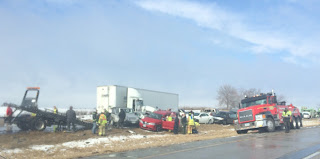The Accident Was A Blur; I Think It Was My Fault
If you’ve ever been in an auto accident, you know it can be a disorienting experience, especially if you believe you’re at fault. The experience can be particularly scary when a crash results in serious injuries. Despite any post-crash anxiety, it’s important to keep calm and act responsibly. Even as you imagine the consequences of your actions, you must take appropriate steps to aid any injured parties. You must also protect yourself from potential liability outcomes.
Never admit fault
It’s okay to speak to the driver and passengers in the other car. If they’re injured, it’s important to assist and comfort them, but guard your words. Never admit that you’re at fault and never apologize. Not to the persons in the other vehicle. Not to the police officers. Not even if you feel certain you were in the wrong. When you talk to police officers, simply tell them what happened. Give just the facts and no more.
Right or wrong, your apology or admission of fault holds a lot of weight. It can come back to haunt you during the claim investigation or years later if the other parties file suit. Imagine an attorney reading your admission of fault in a courtroom someday. Your own words could adversely influence a jury’s decision.
Gather Information
Your responsibilities begin immediately after a crash. You must contact the police and advise them of any injuries. If the injuries aren’t severe or life-threatening, you should exchange license, vehicle and insurance information with the other driver. If the parties in the other vehicle can’t or won’t speak to you, gather as many facts as you can on your own.
- Vehicle license plate number
- Vehicle year, make, model, and serial number (often visible at the lower edge of the car’s windshield)
- Witness names and contact info – If a crowd is gathering, ask each person if they saw the accident. Unbiased witnesses are your best defense against liability, but they might not come forward unless you ask.
Report the claim to your insurance company
How:
1. CallYour Agent; or
2. Go to Your Agents Website/Claims or Service; or
3. Contact the Carrier Directly; link goes to web addresses and 800 numbers
Whether or not you believe you’re at fault, it’s important to report your accident to your agent or to your insurance company’s claim department as soon as possible. They will contact all parties involved, gather critical information, evaluate your auto damage, and investigate any liability issues. If your insurance company adjuster determines you are at fault, your company will pay any covered, accident-related claims.
Let the insurance companies decide
Let the insurance company adjuster decide whether or not you’re at fault. It’s not your call. Iowa, Texas, Minnesota and other states assess negligence based on a comparative fault standard. Statutes in these states recognize that more than one person can be responsible for causing an accident. While you may be negligent, the other person could be equally at fault. One example is where you run a red light, but the other driver is speeding. Your insurance company could decide 50/50 negligence in this instance.
Apportionment of negligence is critical to whether or not your insurance company pays for the other driver’s vehicle damage and injury claims. If the other driver is just as negligent as you, they are just as responsible as you.
Seek medical treatment
If the impact was especially severe, visit an ER or your personal physician for a post-accident check-up, even if you see no visible signs of injury. You may not notice soft tissue or other injuries until several days after a crash. Your physician can give you guidance on self-care and follow up with you to make sure you require nothing more. Also, your insurance company will be less likely to question the relevance of future medical bills if you seek immediate care.
Cooperate with your insurance company
After an accident, both your insurance company and the other driver’s carrier will conduct an investigation. They may develop the information by phone, but if the accident is serious, they will likely do it in person. Claims investigators gather police reports, witness statements, and medical records. Your version of the accident will be a key element of the investigation.
While you have no duty to provide a statement to the other driver’s insurance company, it’s important to cooperate with your insurance company’s claim personnel. In fact, cooperation is a requirement under the terms of your auto policy. You must respond to all of your insurance company’s inquiries and send them any requested documentation. If you receive an accident-related lawsuit, immediately forward it to your agent or to the claim person handling your case. Your consistent cooperation will help the claim process run smoothly and prevent any coverage issues down the road.
You’ll be okay
When you’re involved in what could be judged an at-fault accident, it may take a while to regain your confidence behind the wheel.Just remember you have an agent and a team of insurance company professionals working on your behalf. While they can’t ride along with you, their knowledge and expertise will be there when you need them.
Questions: Call us 515-259-7782 or Easily Schedule a Meeting/Phone Call Convenient to Your Schedule: https://calendly.com/tim-258
Financial products and Insurance are provided through partner carriers. See disclosures and product materials for specific features and benefits. An agency relationship is not created by viewing or reading this blog. Examples of protection are not all-inclusive and policyholders should refer to their policies for full coverage details. ©Smith-Kenyon Insurance Resources, LLC 2018

